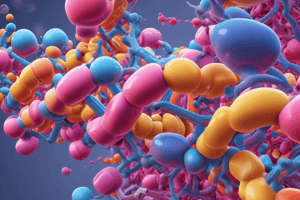Podcast
Questions and Answers
What does a change in conformation of a protein involve?
What does a change in conformation of a protein involve?
- Disruption of hydrogen bonds
- Formation of new bonds
- Rotation about single bonds (correct)
- Breaking covalent bonds
Why do proteins need to adopt multiple stable conformations?
Why do proteins need to adopt multiple stable conformations?
- To increase the number of hydrogen bonds
- To facilitate binding to other molecules or catalyze reactions (correct)
- To decrease the thermodynamic stability
- To break covalent bonds efficiently
What term is used to describe proteins in their functional, folded conformations?
What term is used to describe proteins in their functional, folded conformations?
- Denatured proteins
- Native proteins (correct)
- Non-native proteins
- Partially folded proteins
What are protein segments that lack discernible structure referred to as?
What are protein segments that lack discernible structure referred to as?
Under what conditions do the existing protein conformations tend to be the most stable?
Under what conditions do the existing protein conformations tend to be the most stable?
What is the range of ΔG separating the folded and unfolded states in typical proteins under physiological conditions?
What is the range of ΔG separating the folded and unfolded states in typical proteins under physiological conditions?
Where are disulfide bonds primarily found in eukaryotes?
Where are disulfide bonds primarily found in eukaryotes?
Which type of bacteria typically have many proteins with stabilizing disulfide bonds?
Which type of bacteria typically have many proteins with stabilizing disulfide bonds?
What type of interactions primarily stabilize protein structure?
What type of interactions primarily stabilize protein structure?
In which part of a typical cell is the environment more likely to support disulfide bond formation?
In which part of a typical cell is the environment more likely to support disulfide bond formation?
How do weak interactions compare to individual covalent bonds in terms of breaking strength?
How do weak interactions compare to individual covalent bonds in terms of breaking strength?
Flashcards are hidden until you start studying




